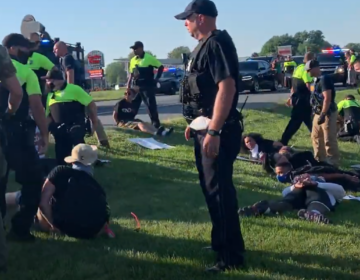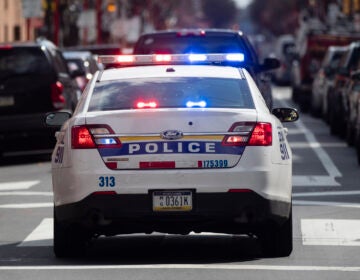Delaware school district approves funding to continue police presence in schools
Leaders in the Christina School District presented a defense of their school resource officers before the board of education approved funding for them.

Sgt. Brian Pixley and Sgt. Troy Pezzuto oversee the school resource officer program for Delaware State Police in New Castle County. (Screenshot)
After weeks of protests following the police killing of George Floyd, some have called on education officials to rethink the idea of having police officers permanently assigned to school buildings. School districts in Minneapolis, Portland, Denver and Seattle have all voted to phase out school resource officers.
Nationwide, there have been instances of SROs overstepping their authority in recent years. According to the Urban Institute, at least two-thirds of American high school students have a police officer at their school. That proportion is higher for students of color.
In 2018, an Ohio school resource officer was put on unpaid leave after activating her Taser near a sleeping student. Though the Taser didn’t touch the student, who was unharmed, police officials said that was a violation of department policy. In October, an officer used pepper spray to break up a fight at a middle school in Phoenix. That same officer was also accused of handcuffing an 11-year-old girl. After protests from students and parents, that officer voluntarily returned to regular patrol.
On Tuesday, the Christina School District, Delaware’s second largest, approved another year of funding for school resource officers, or SROs, in district schools, a contract worth more than $870,000.
“It is a lot of money, but I think it’s money well spent at this juncture,” said board member Monica Moriak. “It’s a one-year contract, so it’s definitely something that needs to be revisited.”
The board heard from school leaders and some officers about how SROs work in schools and their role. Michelle Savage, principal at Shue-Medill Middle School near Newark, said it’s up to administrators to make sure the officers are supporting the school’s philosophy for correcting behavior.
“We understand that behaviors are a reaction to deeper issues that are either academic, or mental health[-related] and need support,” Savage said. “Administrators also understand that it’s their responsibility to work with the SRO to make sure their focus is on prevention and safety.”
Savage told the board that she would not be OK with having an SRO on campus who did not agree with that philosophy.
Stephanie Hartley, a parent who also works in the Christina district, said it is like other districts in Delaware and around the country, where Black students are disproportionately affected by disciplinary actions.
“This is a monumental moment in history, in which the world is no longer able to turn a blind eye to the systems that continue to unfairly treat people with Black and brown skin,” Hartley said. “Grab on to this opportunity to step away from an intervention that has been proven to have life-lasting negative consequences for our African American students.”
Wilmington police officer Hector Tabron is the SRO at Bancroft School, an elementary and middle school in Wilmington. He told the board his job is to be part of the school’s on-site protection, not to be part of the discipline program.
“Our purpose in the school is to be part of the community,” Tabron said. “We build positive relationships at our school, we know our families, and when we see them, they know us.” He said SROs are not punishing students for issues that come across as behaviors. “We are helping with interventions so all students can feel safe.”
Sgt. Brian Pixley oversees the SRO program for the state police in northern Delaware. He said even if SROs were removed from schools, the incidents they now handle would just be handled by other officers.
“We don’t believe that reports to police would necessarily go down if the elimination of SRO officers took place,” he said.
SROs are not “on patrol” at a school, as police officers would be out on the street, Pixley said. “We’re really just reacting to situations and handling them the best way.”
Christina Superintendent Dan Shelton said he’ll launch a listening campaign in the coming months to set the district’s priorities. He expects a discussion of SROs to be part of those discussions.
“What we need to do is make sure we’re leveraging our most important things, the things that will do the greatest good, and quite frankly, the fastest we can do the greatest good,” Shelton said.
On Wednesday night, the Red Clay Consolidated School District board was expected to consider a resolution to terminate the district’s contract with Delaware State Police and Wilmington Police to provide school resource officers. If approved, the resolution will direct the superintendent to use the money previously spent on SROs to fund preventative, trauma-informed interventions from social workers, counselors, psychologists and other mental health professionals.
The “George Floyd and Breonna Taylor Resolution” was introduced by board members Jose Matthews and Adriana Bohm. They say there’s no evidence that student safety increases with school resource officers on campus.
Last year, state lawmakers introduced legislation that would increase the number of school counselors and mental health workers in Delaware schools. That measure was approved in a House committee last year, but never saw further action.

Get daily updates from WHYY News!
WHYY is your source for fact-based, in-depth journalism and information. As a nonprofit organization, we rely on financial support from readers like you. Please give today.






